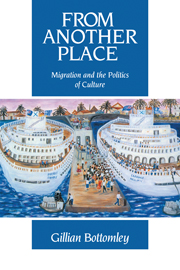Preface and acknowledgements
Published online by Cambridge University Press: 05 November 2011
Summary
From Another Place has developed from over twenty years of research and teaching on the subjects of migration, culture, ethnicity and racism, especially on ways of understanding these and their relation to phenomena such as class, gender and relations of power. Most of this research and teaching has taken place in Australia, where over 20 per cent of the inhabitants were born in another country and 25 per cent are of non-Anglophone origin, in a population of over a hundred ethnic groups. The contrast between the diversity of the Australian population and the prevailing Anglocentrism of discourses and practices of knowledge raises intriguing questions about knowledge and power, as well as forms of resistance, adaptation and transformation that can enable people to weave through and across – perhaps even above – these structured power relations.
This Australia-based work has been complemented by extensive comparative research on international migration (see chapters 2 and 3) and related studies in a major country of emigration, Greece (esp. chapters 5, 6 and 7). The framework developed here includes an argument for an international perspective on migration and a comparative understanding of such notions as tradition and ethnicity. The chapters that concentrate on Greece and Greek-Australians within this comparative framework allow for some illumination of both ends of the migration story as well as of the social, economic and cultural networks of the diaspora.
Information
- Type
- Chapter
- Information
- From Another PlaceMigration and the Politics of Culture, pp. v - viiiPublisher: Cambridge University PressPrint publication year: 1992
